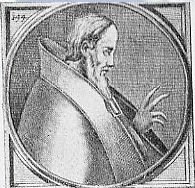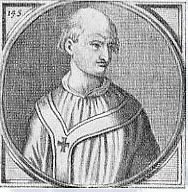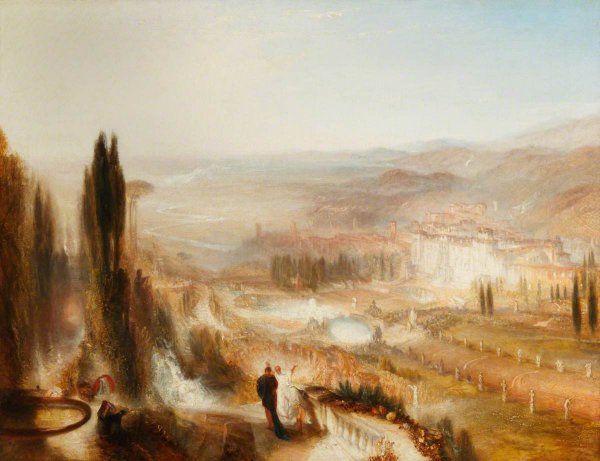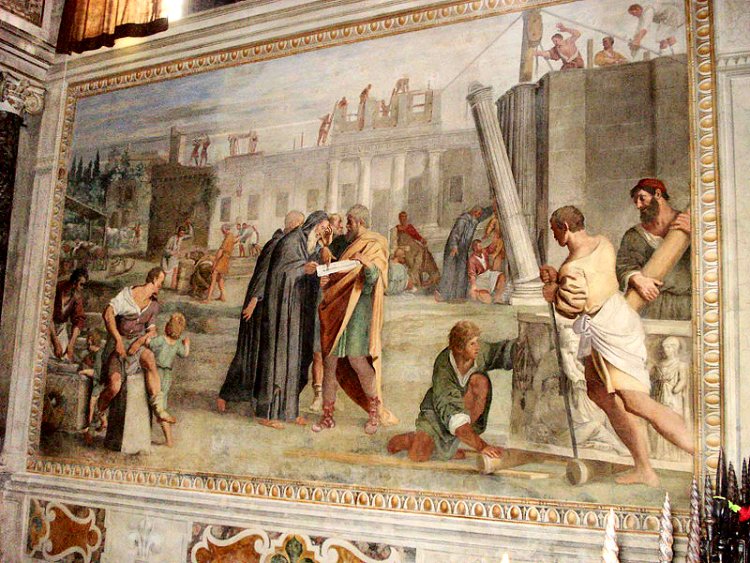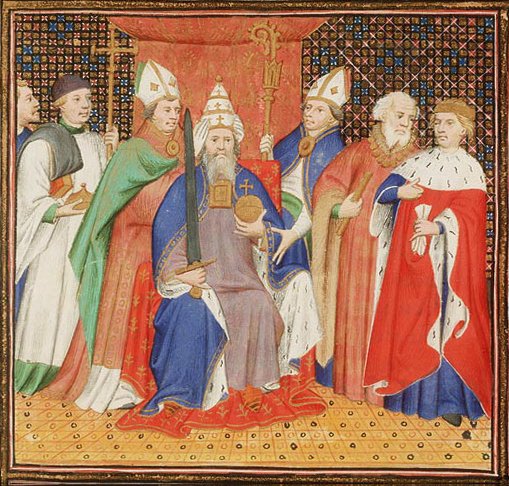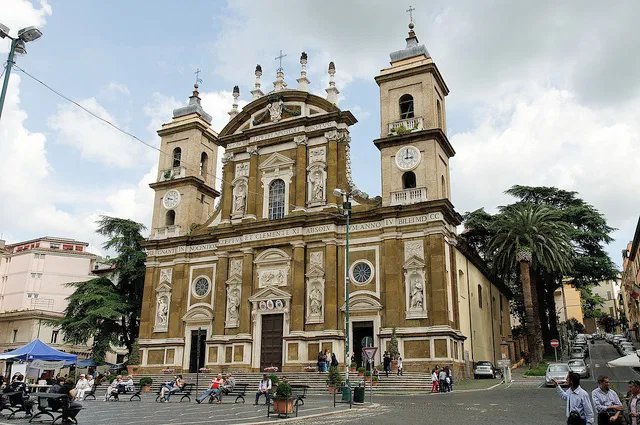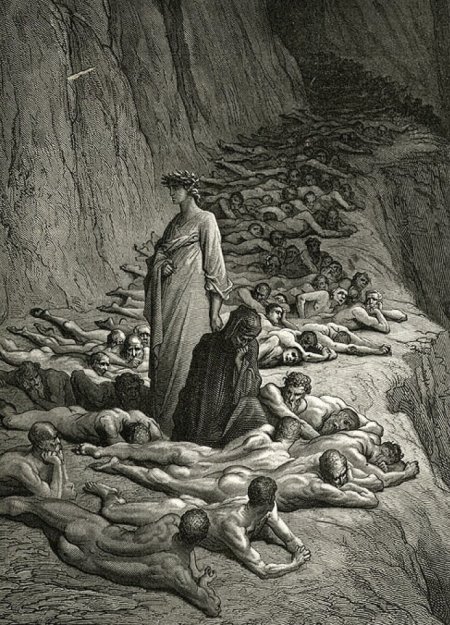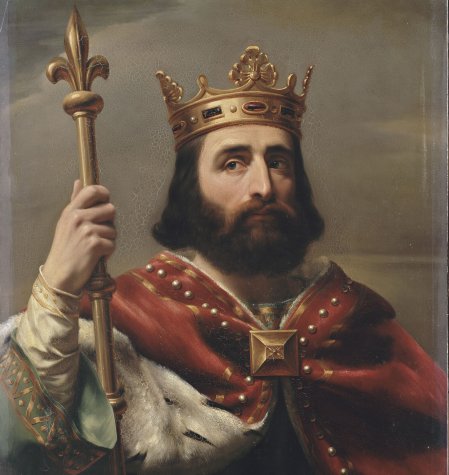Chapter 1: A Special Family
The servant of the servants of God begs indulgence from all who chance upon these wretched scratchings.[1] His miserable eyesight has long since disqualified him from service as a competent scribe, and his right hand, once so dependable, strong, and flexible, has degenerated into a mockery of a lobster’s claw scarcely capable of gripping a quill. He must rely on the left that he so disparaged in his younger days, even though it is now constantly beset by painful cramps. It constructs scarcely recognizable semblances of what once flowed flawlessly and effortlessly from its counterpart. He must lower his nose until it nearly touches the page so that his faded vision can assess whether the scribbles appear passably legible.
He now draws attention to these infirmities not to elicit sympathy as much as to emphasize how fervently the Paraclete has inspired this humble servant to record with utmost accuracy the memories etched deeply in his mind and heart lest the calumnies and diatribes of the destroyers of Christian unity survive as the sole record of an epoch of abject ignorance. Few men on the Italian peninsula are even capable of spreading ink on parchment[2] in a sensible fashion, and most who have written concerning the events and personages of the period are devoid of reverence for the Holy Word. Even men of high standing in the Christian Church have brazenly and repeatedly flouted the clear admonition of the Decalogue against bearing false witness. The deplorable nature of this situation led me to this painful and reckless undertaking.
Likewise the most humble of his monks begs indulgence of lord hegumen,[3] who through the grace of the Savior welcomed him into the beloved monastery that has served for years as an inspirational source of devotion and learning in the Alban Hills. He provided his eldest and least capable follower quill, ink, and parchment for use by the scribes whom he was assigned to oversee. I[4] confess that I secreted a quantity of these materials and diverted them from their intended sacred purposes to my own, which the hegumen may consider too profane. May the Lord have mercy on my soul if His Divine Judgment deems this conduct blameworthy. That it violated my sworn oath of obedience is beyond dispute. I plan to confess the sin before I die and to beg for absolution, but if it is withheld, I will accept whatever punishment the Lord determines appropriate.
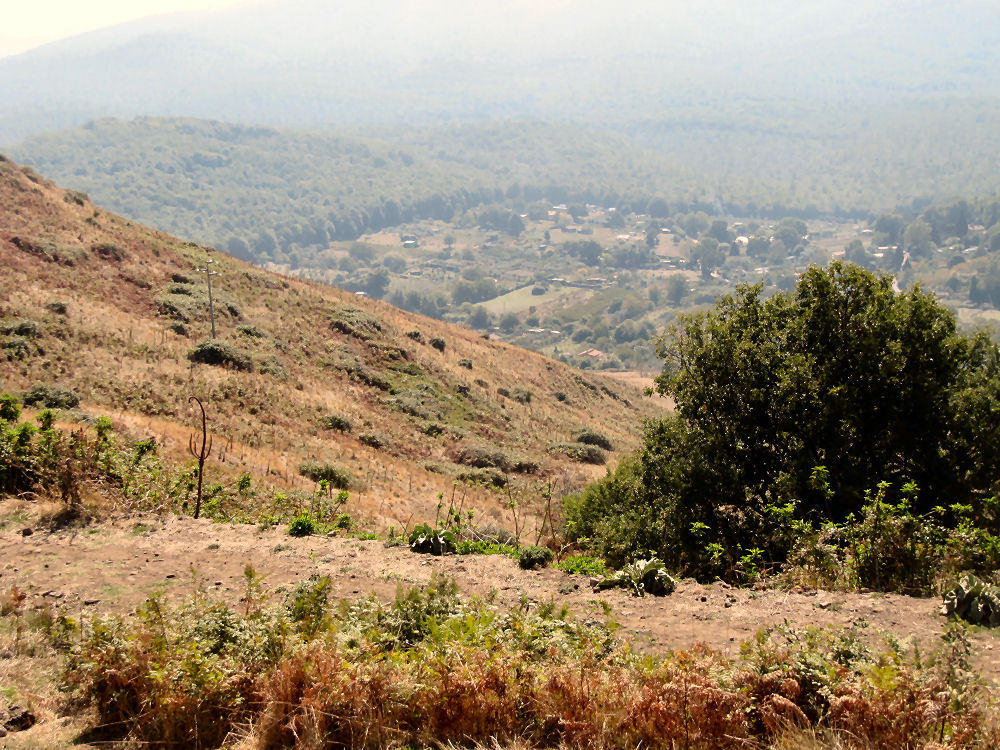
My birthplace of Tusculum[5] has for centuries been renowned throughout the civilized world as a modern Eden, the most precious jewel in the Almighty’s earthly treasure trove. How felicitous for any of God’s servants to commence their existence in these blessed Alban Hills! Tusculum is so close to Rome that before my eyes became clouded I could easily discern the city far below. Yet it is far enough removed that its inhabitants have for centuries been able to avoid exposure to the filth, disease, and discomforts of urban life that have long ago overtaken the center of Christianity in the west.
What a blessed time to be born, precisely one thousand years after the Passover during which the adolescent Savior stunned the elders in the temple in Jerusalem with his divine knowledge and wisdom! Chroniclers agree that three events distinguished the year of our Lord 1012. The first was the overdue and eagerly anticipated passing of that despicable tyrant, John,[6] the scion of Satan’s adopted family, the demons of the Sabine. The ignominious felon had treated Rome as his personal domain during the entire decade since he and his clan had cannily conspired to effect the ruination of the brilliant Pope Sylvester along with his pupil and patron, Emperor Otto,[7] both of whom had selflessly and tirelessly devoted themselves to the Church and the furtherance of God’s Will.
Less than a week after John’s demise, the universally disdained Peter Pig’s Snout, whose bloated boil-ridden buttocks the fiend had deposited on St. Peter’s Throne, followed his despicable master to the grave. Sergius, called the fourth,[8] as Peter named himself, would never be permitted to soil the Lateran Palace with his filthy feet again. Instead, the Roman people, freed from the yoke of this oppressive band of thugs, led by the most righteous and respected of the clergy, arose as one to thunder their approval for the new pontiff, Benedict VIII. Thus began an age of renewed respect for the values and principles of the Roman Church as enumerated by St. Peter and his successors. For Pope Benedict was an intelligent, saintly, and forthright man who refused to be intimidated by the Sabine contingent. He also understood well how to employ every resource at his disposal with equal parts decisiveness and equanimity. With little difficulty he routed the pretender, causing his hasty flight across the mountains.[9]
It would be false modesty, the commission of which sin has seldom been associated with my nature, to neglect the third event of that year, my own birth, which occurred within a month of the investiture of the new pontiff. My parents, the estimable Count Alberic of Tusculum and Lady Ermelina of Spoleto, named their second son Theophylact[10] in honor of his uncle, the man upon whose saintly head rested the papal tiara.[11] I have proudly borne a noble name, indicative of our Greek ancestors[12] and our long and faithful devotion to Christ and the Church.
Over the years I have overheard numerous ignorant Latins express disdain for the name that I proudly share with both the Supreme Pontiff at the time of my birth and the very first Count of Tusculum.[13] Had their lazy tongues been endowed by almighty God with sufficient skill to enunciate the first letter,[14] or had their empty skulls contained a snippet of knowledge regarding its derivation, they would surely have exhibited more respect. Instead, they corrupted our noble Greek name into the unworthy moniker, “Teofilatus.” Never, I hasten to add, have these five syllables passed my own lips. The mere appearance of the ten characters on the page before me generates malicious bile.
This narrative of my first year of life would be incomplete if I neglected a fourth event, my own baptism. No one expects someone of my years to recall any details of the ceremony, but others have assured me that several important personages attended the ceremony in the cathedral.[15] My parents and my older brother Gregory were certainly present. The traditional rites were conducted by my uncle, the Bishop of Rome. In fact, it was the first baptism that he had ever performed.[16] Lazaro, the revered Bishop of Tusculum,[17] assisted him. The presence of my other uncle, the unobtrusive Romanus, was not recorded, but he was no doubt present in some capacity.
John Gratian, the Archpriest of the Lateran and the first cardinal-priest appointed by the new pontiff, served as my godfather. Over the years I came to know him quite well as a Jew who possessed much more wealth than sense. In fact, Gratian was a simpleton whose ascension to such an esteemed position in the hierarchy can best be explained by the hope and expectation of the devious scoundrels who had controlled the papacy before my uncle's ascendance that they might arrange to separate him from a hefty portion of his family’s fortune. After those villains had been forced back into their rat hole in Sabina, the Holy See wisely allowed Gratian to remain in his position. A place of honor as my godfather was even reserved for him in one of the first ceremonies overseen by the new pontiff. The fact that Gratian's wealth had resulted from the usurious contracts of his relatives was deemed by all insufficient reason to alienate a man of his prominence. My uncles considered it far wiser to keep him within arm’s reach.
Except for Bishop Lazaro, who was called to his celestial reward when I was still a toddler, all these men played important roles in my life. I can visualize them gathered around the baptismal font far more clearly than I can see the wretched hand that is at this moment scarcely a span from my withered face. All present deferred to the majesty of Pope Benedict. His entrance into any chamber immediately drew every eye to his mien and figure. Power and intelligence radiated from every glance. He exerted command over his underlings with scarcely a twitch of an eyebrow. Uncle Romanus, in contrast, probably positioned himself in the background, stolid and attentive with his powerful right hand resting gingerly on the hilt of his sword. Gratian’s scalp at that point had not yet completely relinquished its curly black outgrowths. Even in those days his face was dominated by the long droopy nose flanked by vacant black eyes that betrayed the inactivity behind them. He probably prayed loudly and intently for the infant’s future health and success. Despite his upbringing among the Jews in Trastevere, the man was famous for devoting a substantial portion of every day to prayer. Perhaps he fretted that the Almighty might need his help in directing the affairs of His creation.
O happy the day on which God removed the stain of original sin from the immortal soul of his tiny servant and guided him to the entrance to the rocky and uncertain path that leads to the Kingdom of the followers of His only Son! Recounting the event brings warm tears of joy that my wrinkled cheeks can feel trickling from clouded orbs.
No upbringing could have been more pleasantly formative than my own youth. Not only did the Lord place me in the most healthful[18] and lovely spot in His creation. He also provided me with an older brother Gregory who eagerly expanded my horizons by sharing his hard-earned experience and knowledge, as well as two younger siblings, Peter and Octavian, to whom I could joyfully relate my own discoveries and ideas. My parents, too, were beyond compare. They were sufficiently wise not to cater to every whim of their offspring, and yet they generously provided us with everything that we needed to develop into capable and virtuous men equal to the challenge of steadfastly discharging our hereditary obligations.
A word about those obligations is in order. The few Romans possessing any knowledge of history concede that the founding of Tusculum predated that of Rome itself. Although the town of Romulus and Remus has for centuries been larger and more influential than its lofty neighbor founded by Telegonus, Romans have throughout the ages looked up to Tusculum both literally and figuratively. In Rome's heyday its most prominent citizens maintained splendid villas in the hills. When in dire need of assistance or leadership the Romans often relied on their Tusculan neighbors. After Rome had descended to its nadir in the early part of the previous century, its wisest citizens pleaded with Count Theophylact to reestablish order within the city. He, his wife Theodora, and their daughter Marozia[19] dutifully abandoned their idyllic lives in the Alban Hills and devoted their energies to the restoration of honor and glory to Rome and to its most prominent institution, the Holy See, an onerous task, too difficult for any one man or even one family to accomplish. Our family has never shirked its mission of returning Rome, the Church, and the Petrine Patrimony[20] to the exalted status enjoyed in bygone eras. The stain of the Sabine miscreants having been expunged, Uncle Theophylact[21] assumed the pontificate. Uncle Romanus became dux and patrician, and my father, Count Alberic, managed the family properties in the Alban Hills and arranged for the buildup and training of an armed force to counter the Saracens and to prevent Rome from backsliding into the morass.
My mother was an educated and sophisticated woman. She taught me to read and write Latin. In my sixth year my father arranged for monks from Grottaferrata[22] to journey up to our residence to provide me with additional schooling. My grandfather[23] had granted to a monk of the Order of St. Basil named Nilus[24] the property and buildings for a monastery near Tusculum. In addition to their primary responsibility of giving glory to God, the monks collected and maintained the largest assemblage of Greek texts in the vicinity. They also graciously undertook the education of young members of the family in the tongue of the gospels. Most Romans of my era had little interest in the written word in any language, even Holy Scripture. These wretches focused their energy on the quotidian tasks of finding food for their tables and of protecting their meager possessions from malicious neighbors or, in far too many cases, plotting to relieve others of their goods. Even exalted members of the Roman clergy often evinced shameful ignorance. Most had absorbed from diverse sources a few stories from the Bible. The priests and monks related their versions of these tales in the pulpit and in public in order to imprint on the ignorant Christian faithful the importance of attending services, tithing, or whatever cause they favored at the time.
Even among the residents of the Alban Hills, where life was so much more pleasant than in the lowland urban environs infested with disease, crime, and licentiousness, most children received little or no schooling. Few could read or write. I once asked my mother why my brothers and I must devote our days to memorizing the tiresome lessons assigned by the monks while other children freely cavorted with their friends and animals. She lay aside her embroidery, seated herself next to me, enveloped my small hand in her wonderfully warm and soft ones, and explained to me in a voice simultaneously firm and gentle that the Heavenly Father provided each of us with four precious gifts: a soul, a heart, a body, and a mind. Each soul was of precisely equal value in God’s eyes, but with regards to our hearts, minds, and bodies all humans were very different. To help me comprehend the point she contrasted my older brother, who was strong as a bear and fast as a hare, with a serf's daughter named Elena, who was approximately Gregory's age. She had been born with a hunchback and a harelip. “Don’t ever forget, Theophylact, that the Lord loves Elena’s soul every bit as much as He loves Gregory’s.” I never did forget.
Nevertheless, as she patiently explained, certain individuals had obviously been blessed with the qualities of heart, body, and mind more adapted to tending God’s kingdom on earth in accordance with the gospels. Mother noted that everyone, including our own family, had a sacred obligation to develop all three faculties in order to fulfill the particular responsibilities that God had assigned. Some requirements were the same for all people, and those had been specified in the Bible. Other responsibilities were, however, not the same for each person. Most, like Elena and the simple souls who minded our family’s estates, had not been challenged to face the onerous obligations designated for my father, my uncles, myself, and my brothers. The task assigned to most of those people was simply to find inspiration in the words of the priests and the wonders of nature so that by their words and deeds they could merit the reward of spending eternity in the Divine Presence. Our family’s roles were much more demanding and necessitated extensive preparation.
The concepts explained by my mother made an indelible impression on me and my brothers: soul, heart, body, mind. They were emphasized to us again and again. My brothers and I came to appreciate that others were loved equally by God, but very important missions had been specially designed for us. Each of us knew from an early age that we must embrace the tasks assigned to us and do everything we could to bring them to successful conclusions.
My mind possesses nothing but fond memories of my primary tutor from the monastery, Brother Alexius. His black robe was threadbare but clean, and, like all of the other monks of Grottaferrata, he wore the Pauline tonsure,[25] which was seldom seen in Rome or its vicinity, and he never shaved or even trimmed his beard.[26] I thought of him as an elderly man, but it now seems likely to me that at the commencement of our sessions he could not have completed his fortieth year. For nine years I spent my days with him or, if he fell ill or faced other obligations, with Brother Clement. The latter was distinguished by his exceptional height, his bony fingers, and his prominent Adam’s apple. Brother Clement was more youthful than Brother Alexius, and his gaze lacked the serenity of Brother Alexius’s. Although they were both always kind to me, they also firmly insisted on a precisely correct recitation of each day’s lesson. Nothing short of perfection was tolerated.
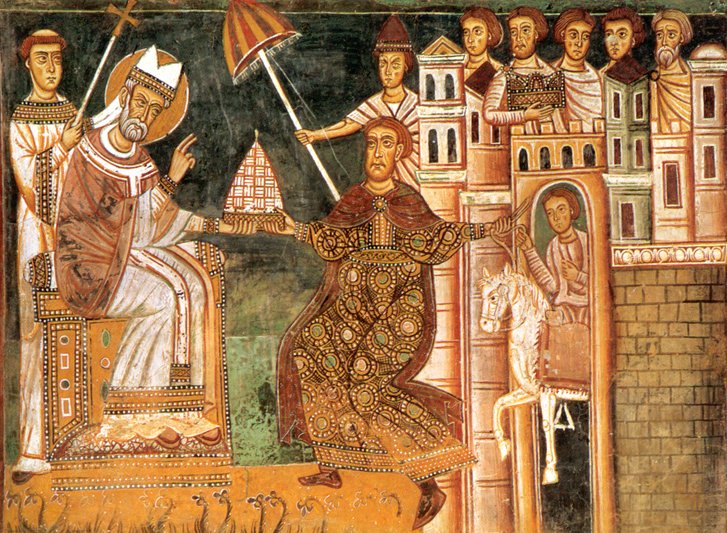
The texts chosen for my lessons consisted mostly of the Old and New Testaments and other sacred documents. Included in the latter were several letters from pontiffs of bygone years and a copy of St. Constantine’s[27] decree that recognized the Bishop of Rome, Sylvester, as the rightful ruler of most of Christian Europe west of Greece. The task immediately before me was to understand the vocabulary and syntax of each document in order to glean the author's intended meaning. Concentrating on the mundane aspects of the task often proved challenging for my mind, which frequently seemed more adept at comprehending large concepts than dealing with tiresome details. Nevertheless, I managed to attain a satisfactory level of competence in reading and writing both Latin and Greek.
The texts concerning St. Constantine prompted me to assail my tutor with queries about empires and emperors. My brothers and I had marveled at tales of the glorious leaders of the ancient Roman Empire. We had also heard about the emperors who now lived beyond the Alps. I asked Brother Alexius whether the two were related. He explained to me that the empire founded by the Caesars persisted to our own time, but the barbarians to our north, who used the same terminology to describe themselves and their domain, were not associated with it. I learned that centuries ago St. Constantine had constructed a great capital very far away and had named it after himself. On its completion he and many associates abandoned Rome and moved to the new city.
My tutor then grew uncharacteristically whimsical and disclosed that he had in fact spent his youth in the great city of Constantinople. When I asked him where it was he told me that it was far to the east. “As far as Jerusalem?” I asked.
“More or less, but Jerusalem lies far to the south of Constantinople.”
“How long would it take me to walk there?”
“Several months.”
“Months?” I cried in shock. I had never imagined that the world could be so large. I found a rock, placed it on the ground, and called it “Tusculum.” I placed another a span away, and I aligned them so that the second was in the direction of the capital below us. I named it “Rome.” I then handed two egg-sized rocks to Brother Alexius and told him that they represented Constantinople and Jerusalem. I asked him to place the stones so that I might understand the locations of the cities.
Brother Alexius smiled. Then he hurled the Constantinople rock with all of his strength to the east. He then pivoted a bit to his right, and launched the other one. I stood grinning in undisguised awe. In the first place, I had never seen Brother Alexius engage in any activity more demanding than strolling in prayer or turning a page of a manuscript; moreover, I could scarcely fathom that anyone lived so far from the center of civilization, which I naturally assumed to be Rome, Christianity's capital.
Brother Alexius was too charitable to take joy in confounding a young protégé. He explained that his own life had actually begun in the outskirts of Constantinople, and he had resided for more than two decades in the imperial capital. While there, he had been inspired to join the Order of St. Basil. He was first assigned to a local monastery. After two years he had been ordered by his hegumen to sail to Bari.[28] From there he had traveled throughout southern Italy before joining the followers of Nilus.
Brother Alexius’s depiction of the marvels of Constantinople startled me. He claimed that, in sharp contrast to Rome, the new capital had advanced since Constantine’s time. Clean water was available in every residence within the city walls as, he insisted, had once been the case in Rome. Crime was rare, and miscreants were summarily punished. Most men in Constantinople were literate, knowledgeable, and prosperous. Merchants regularly traded with strangers from all over the empire, which reportedly stretched from within a few miles of our home all the way to Babylon and beyond. He recited the names of dozens of locations unfamiliar to me, and he astounded me with the claim that even if he picked up the “Constantinople” rock and launched it from its landing spot, some of the locations that he had mentioned were still so distant that he could not possibly show me by throwing the stone. “The Heavenly Father has provided his creatures with an enormous and bountiful home teeming with delightful strangeness. No matter how hard you tried or how long you spent, you could not possibly imagine a tenth-part of its wonders.”
“Are there as many books in Constantinople as there are in the monastery?”
Brother Alexius chuckled and tugged playfully at his beard. “For every volume on which we monks in Grottaferrata have managed to lay our unworthy hands, the emperor’s library in Constantinople has one thousand, two thousand, perhaps ten thousand. What’s more, many citizens of Constantinople actually have read those books, and more than you could imagine are busy composing new ones. They have consistently kept careful records of what has transpired around them. Here is something that will certainly surprise you: the scholars there are much more knowledgeable of the history of ancient Rome and its bishops through the ages than any Roman. Their capital remains a place of learning where culture and ideas are freely exchanged. Every novice in Constantinople is more educated than the most learned monk in Italy, including the brothers here.”
“But how can that be, Brother Alexius? Rome is the home of Holy Mother Church and Christ’s Vicar on earth, His Holiness, the Supreme Pontiff.”
“That is true; Pope Benedict is universally recognized as primary among the patriarchs of the Church, as were his predecessors. We should revere him and obey him unquestioningly. There is no reason, however, to pay homage to the city in which he happens to find himself today. Compared to the great capitals of the world, Rome is but a rundown disease-ridden pool of ignorance, crime, and depravity. It disgraces the legacy of the apostles Peter and Paul.”
I had never before heard Brother Alexius, or any of his fellow monks, speak with such disdain and bitterness, and it shocked and saddened me. However, the dour mood did not prevail. His face soon assumed a joyful glow as he described his encounters in Constantinople with people from distant lands. The colors of their skin varied, and he described the shapes of their faces, the arrays of colors and textures of their hair, and their vastly divergent mannerisms. Their languages often sounded strange to his ear. Some who had no familiarity with either civilized tongue had nevertheless reportedly made interesting and valuable discoveries that had astonished even the learned Christian scholars of the East.
My mother had made it clear to us that God had provided Pope Benedict and all members of our family with the qualities of heart, body, and mind required to lead the Christian community. Why then had He bestowed on those unworthy heathens skills and knowledge that were unmatched by Christians anywhere? Brother Alexius must have detected the confusion and consternation on my countenance. He said, “Be assured that the Lord has a plan for each of His creatures. Each Christian is responsible for devoting his life to His Will. Strive to learn from everyone, even those who have not yet found the Lord’s path. You cannot teach what you have failed to learn.”
In my ninth year my father accompanied the Holy Father on a trip across the mountains to consult with the Germanic emperor concerning the threat from the Saracens[29] in Italy. They had made worrisome incursions into Apulia and Campania. My older brother Gregory begged to accompany the pontifical party, but instead my father appointed him captain of the city’s defensive forces for the duration of his absence. Perhaps Gregory decided that that responsibility posed an insufficient challenge; at about the same time he also undertook my own martial training. Since I craved adventure and the attendant glory as much as my brother did, I enthusiastically submitted to his ministrations.
Gregory always began our sessions with exercises to improve my strength and endurance. He often seemed not to appreciate the limitations of a boy of my years, and neither did he account for the difficulties that I experienced in trying to complete the routines that were familiar and easy to a lad of fifteen. Whenever I faltered, he screamed at me and punched or kicked me in the ribs. He never showed me the slightest bit of mercy or even consideration. Whenever he noticed tears welling up in my eyes, he warned me that if he espied a single drop on my cheek, I would pay the price. Over the ten long years of my training period I paid for my tears. I never approached the strength or skill that my brother exhibited, but my body eventually achieved its potential, or nearly so. I would later need all of that strength and endurance to fulfill the hazardous missions that the Lord had devised for me.
After the preliminaries had been completed, Gregory and I practiced techniques of unarmed combat. He showed me how to punch and how to block a punch. To my great consternation he concentrated on the former long before he demonstrated the latter for me. He was a master of a dazzling array of tricks and holds, and he always challenged me to escape from them. He taught me to deliver debilitating blows with my hands, my feet, my knees, my elbows, and the crown of my head. Above all he emphasized balance and leverage. I became conscious of my own locus[30] and that of others.
One mid-winter afternoon stands out in my memory. A light snow was just beginning to fall when my brother stealthily approached me from behind and applied a headlock. The pain was intense, and I had never felt so hopeless. “Do you yield?” he asked.
I struggled for as long as I could before responding, but my probes found no exploitable weakness in his grip. I could hardly stand the pain, and my mind was beginning to become addled as my head grew isolated from my body. “Yes,” I cried, “I yield.”
“No! Never yield! No matter how great the pain! We are Tusculans. We cannot yield; it is not in our nature. The Lord has provided our family with munificent gifts to fulfill its divine mission. Find a way to fight back. Don’t think about it; just find it. If you die in the process, so be it.” He squeezed me so hard that I became convinced that, even if I survived, my ears, if they did not fall from my face entirely, would thereafter lie flat and useless against my head.
I desperately tried to reach for his face, but he arched his back, and my arms failed to locate a vulnerable spot. Suddenly my right hand executed a plan. I swear that my mind contributed nothing. I had turned it off. Over the years I have noticed that my body occasionally acted without an order from my mind or heart. Unbidden, my right hand found its way to my brother’s private parts.[31] I ignored all the pain signals coming from my head, and my heart directed all my remaining strength to that hand. I squeezed and twisted, and within a few heartbeats both of us were writhing in breathless agony in the snow. I had learned a valuable lesson, and so, I suspected, had he.
Gregory used correspondingly brutal techniques to teach me swordplay and horsemanship. Every evening I returned to our abode in time for supper adorned with new bruises and scrapes. Occasionally my brother had to carry me home on one of his broad shoulders. Over the years I broke my right leg three times and each arm once. I also seriously injured my left shoulder. On those occasions Brother Hieronymus fitted me with splints, slings, and crutches, and each time the Lord eventually restored my youthful body. Training resumed as soon as I was close to being sound again. The intensity never lessened with my injuries. Indeed, Gregory seemed determine to make up for any time lost in recuperation.
Despite this merciless treatment I never resented my brother. On the contrary, my admiration for him was boundless. His speed, strength, agility, and conditioning had no equal in all of the Alban Hills, perhaps in all of Rome. He was not tall, but he had inherited his father’s famous shoulders and exceptionally strong limbs. He was an accomplished rider, archer, and swordsman. Furthermore, he was a born leader. My father gave him permanent command of the pontiff’s army before he was even fully grown. Regardless of his youth, every man-at-arms would have followed him into Satan’s lair and savored the opportunity. Every young man in Rome and its environs envied Gregory, and every young woman who glanced at him for even an instant was immediately captivated. I aspired with all my heart to emulate him, but I felt certain that my virility could never match his.
[1] Indeed, the penmanship throughout the manuscript was extremely difficult to decipher. The author freely mixed Church Latin and the vulgate, and spelling was not his forte. He must have been quite fluent in Greek as well. Greek words abound. In fact, in some cases entire paragraphs were written in Greek.
[2] Parchment, which is made from the hide of sheep, was quite valuable in the eleventh century.
[3] This evidently refers to the hegumen (abbot) of the Exarchic Abbey of St. Mary in Grottaferrata, a medieval monastery run by monks of the Order of St. Basil. It still functions more than a millennium after its founding.
[4] The text actually uses the first person plural, not the singular. This switch from the third person singular to the first person plural is consistent with the few letters attributed to Pope Benedict IX in the Vatican’s collection. The first person plural form was maintained throughout the actual manuscript, but the translator has replaced it with the first person singular for purposes of readability.
[5] Only ruins of Tusculum remain. It was leveled in 1191 by an army of Romans. Prior to that occasion it was protected throughout most of the twelfth century by the Holy Roman Emperors. In the eleventh century it was a very important city with its own bishop and cathedral.
[6] This appears to refer to the man now commonly called John Crescentius. Despite the author’s attributions, the Crescentius clan was rather closely related to the counts of Tusculum. Both were probably descended from the first Theophylact (864-924).
[7] Emperor Otto III died in January 1002 near Rome at the age of only twenty-one. His tutor, Pope Sylvester II, died in Rome in May 1003 at the age of fifty-seven.
[8] The author employed this method of denoting the number associated with popes, kings, and emperors throughout. The translator opted for the more familiar style of Roman numerals in the remainder of the manuscript.
[9] The author apparently is referring to an antipope named Gregory who tried unsuccessfully to persuade King Henry II of Germany to support his claim to the pontificate.
[10] The author always used Greek characters to depict the spelling of his given name.
[11] The tiara, which eventually included three tiers, was a crown that was identified with the papacy. Before Pope Paul VI retired it in 1963, popes always wore the tiara on official occasions.
[12] The people of Tusculum had long claimed that the town was founded by Telegonus, who was allegedly the offspring of Odysseus and Circe.
[13] Pope Benedict VIII’s given name was also Theophylact. The other Theophylact mentioned by the author had been Consul and Senator of Rome in the early tenth century. His two daughters Marozia and Theodora count among their descendants five popes in four generations as well as, in the opinion of many experts, the entire Colonna family, which produced one very important pope, Martin V, and numerous influential cardinals.
[14] The author is evidently referring to the Greek letter Θ, which has no equivalent in the Roman alphabet, and no combination of letters produces the sound in Latin or Italian.
[15] Tusculum was the see of a diocese, and it therefore had a cathedral. When the town was destroyed by the Romans in 1191, the see was moved to Frascati, which to this day has a cathedral.
[16] Evidently Theophylact was not ordained a priest until after his selection as pontiff. Until the last few centuries it was not unusual for men outside of the clergy to be selected as pontiff. Aside from the puzzling example of Pope Adrian V in 1276, they all received Holy Orders immediately upon their election.
[17] I found no references to this bishop in any other work.
[18] Eleventh-century Rome was still subject to frequent outbreaks of malaria and other diseases probably due in large part to the deplorable hygiene. Tusculum was considered much healthier, even in imperial times.
[19] They also had another daughter named Theodora. She was apparently not directly involved in papal politics, but in all likelihood Pope Benedict VIII and his brothers numbered among her descendants.
[20] In the late eighth century the Frankish kings Pepin and Charlemagne, having defeating the Lombards, made large bequests of land in central Italy to St. Peter. They entrusted the pontiff and his successors with the right and obligation to rule these territories on the apostle’s behalf.
[21] This Theophylact is different from the one just mentioned. The uncle is better known as Pope Benedict VIII.
[22] In the text the author consistently referred to the monastery by its original name, Cryptoferrata, which he always wrote half in Greek and half in Latin.
[23] Count Gregory, the father of three important men: Theophylact (Pope Benedict VIII), Romanus (Pope John XIX), and the aforementioned Alberic (the author's father).
[24] Now known as St. Nilus the Younger.
[25] For many years monks of the Eastern rites shaved their entire heads.
[26] The monks of Grottaferrata came from Calabria. They practiced (and still do!) the Greek rites rather than the Roman rites.
[27] Emperor Constantine the Great has always been considered a saint in the Greek Church, but no pope has ever canonized him.
[28] Bari is a port city in southern Italy on the Adriatic. Throughout the tenth century and in the early eleventh century it was part of the Byzantine Empire.
[29] A very peculiar thing to say. Southern Italy was dominated by the Byzantine Empire in the early part of the eleventh century. The Saracens made occasional raids from Sicily, but the threat for which Pope Benedict VIII sought assistance was from the Greeks in Constantinople. Emperor Henry II led a substantial campaign against them beginning in 1022.
[30] Center of gravity?
[31] The author used the word “gorzo” repeatedly in this work. It can be found in no dictionary, but no other sense fits the context here and elsewhere.

